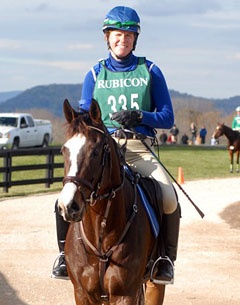
Guest columnist of the week is Sara Lieser, the managing editor of The Chronicle of the Horse magazine. She began working at the Chronicle in 2004 and has been covering top level dressage ever since.
An avid rider herself, Sara mainly competes in eventing, but she treasures the opportunities she's had to sit on FEI schoolmasters. She lives in Virginia on a small farm with her husband, two dogs, four cats and an ever changing number of horses.
Riding Behind Closed Doors?!
While spectating at a recent dressage show, I watched an up-and-coming young adult have a meltdown in the middle of her test. Her horse grew increasingly less cooperative, until, in a fit of frustration, she yanked hard on the curb rein as she spurred her mount. She excused herself soon afterwards.
A bystander next to me murmured, “You can’t do that in the test. You can’t lose your temper and let the judges see you do something like that.”
What struck me about that moment wasn’t the abuse going on ringside—it wasn’t pretty, but the rider realized her mistake. Instead, I was alarmed by the attitude I see over and over again in dressage—the belief that if it’s going to get ugly, then it should be kept private. I’ve seen it multiple times when clinics were closed to auditors. “What if the clinician wants to bring out the whip? What would all the spectators think? How can we get serious training accomplished if we have to worry about what the uneducated masses think?”
Now of course, there is riding that is ugly because it isn’t fair to the horse and isn’t accomplishing anything, such as the frustrated rider in the middle of her test. But there is also training that may appear harsh to the novice eye but is actually working toward a reasonable goal. Sure, we want to believe horses just offer up piaffe and passage from the pure joy of completing the movements, but that’s simply not true. Horses don’t arrive at Grand Prix without rigorous, consistent training. Doing dressage well is physically taxing to horses, and at some point during their training most of them need a little convincing that life is going to get uncomfortable unless they do as they are asked.
When you limit who can observe, you convince those left out in the cold that you are hiding something. I believe the average adult amateur can handle the knowledge that horse training isn’t always pretty as long as he or she gets regular exposure to the process. However, if amateurs are never allowed to see the real training that happens behind closed doors, then professionals can’t blame them for being surprised to discover that dressage is actually a sport, not a loving duet between man and beast.
Just as Olympic caliber runners must train their bodies more rigorously than weekly joggers, top riders have to push their horses to the edge if they want to be competitive. Think of Béla Károlyi on the sidelines at the Olympic Games, demanding all but impossible feats of athleticism from his pre-adolescent gymnasts, taking a firm stance when they don’t live up to his expectations, but offering praise when they deserve it.
However, when the “untrained” eye watches a “training technique” and says, “Oh, how horrible!” then we also have to ask ourselves if this is truly acceptable. Riders can be blinded by their ambition, and they are not their own best watchdogs. It’s not that they don’t adore their horses—but you don’t get to the top without taking some risks. It can be difficult to even know what abuse is, especially if riders using the same methods surround you.
Top riders have to fight the urge to form an impenetrable club, one that firmly shuts the door in the face of the amateur who seeks to learn the truth of the training process. Not only does this do a disservice to the large numbers of lower level riders who make up the majority of dressage, but it also leaves those in the club vulnerable to using ever-tougher techniques as they lose perspective in their quest to be competitive.
Horse welfare isn’t a black and white issue, but openness and transparency in the training benefits everyone.
by Sara Lieser
Check out Eurodressage's other Guest Columns